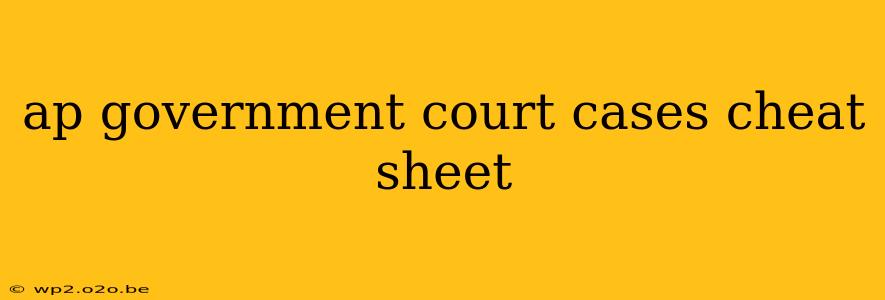This cheat sheet provides a concise overview of key Supreme Court cases frequently covered in AP Government courses. It's designed for quick review and prioritizes understanding the core principles established by each case. Remember to consult your textbook and class notes for a more comprehensive understanding.
Landmark Supreme Court Cases: A Quick Reference
This cheat sheet organizes cases thematically for easier memorization and understanding of the broader legal principles involved.
I. Cases Related to Federalism and States' Rights:
-
McCulloch v. Maryland (1819): Established the principle of implied powers, allowing Congress to exercise powers not explicitly stated in the Constitution if they are "necessary and proper" for carrying out its enumerated powers. Reinforced national supremacy over states. (Key Concept: Necessary and Proper Clause, Supremacy Clause).
-
Gibbons v. Ogden (1824): Defined the scope of Congress's commerce power under the Commerce Clause, granting Congress broad authority to regulate interstate commerce. This significantly expanded federal power over the states. (Key Concept: Commerce Clause).
-
United States v. Lopez (1995): Limited Congress's commerce power by ruling that the Gun-Free School Zones Act exceeded Congress's authority under the Commerce Clause. This represented a pushback against expansive interpretations of the Commerce Clause. (Key Concept: Limits on Commerce Clause).
II. Cases Related to Civil Liberties and Rights:
-
Marbury v. Madison (1803): Established the principle of judicial review, giving the Supreme Court the power to declare laws unconstitutional. This is arguably the most significant case in American legal history. (Key Concept: Judicial Review).
-
Gideon v. Wainwright (1963): Guaranteed the right to legal counsel for indigent defendants in felony cases, extending the Sixth Amendment's guarantee of legal assistance. (Key Concept: Sixth Amendment, Right to Counsel).
-
Miranda v. Arizona (1966): Established the Miranda rights, requiring law enforcement officers to inform suspects of their constitutional rights before questioning. (Key Concept: Fifth Amendment, Self-Incrimination).
-
Mapp v. Ohio (1961): Established the exclusionary rule, preventing illegally obtained evidence from being used in criminal trials. This applied the Fourth Amendment's protection against unreasonable searches and seizures to the states. (Key Concept: Fourth Amendment, Exclusionary Rule).
-
Tinker v. Des Moines (1969): Affirmed students' First Amendment rights to freedom of speech in schools, as long as the expression doesn't disrupt the educational environment. (Key Concept: First Amendment, Freedom of Speech).
-
Roe v. Wade (1973): Established a woman's constitutional right to an abortion, based on the right to privacy implied in the Fourteenth Amendment. (Key Concept: Fourteenth Amendment, Right to Privacy). Note: This remains a highly contested and evolving area of law.
-
Brown v. Board of Education (1954): Declared state laws establishing separate public schools for black and white students to be unconstitutional, overturning Plessy v. Ferguson and marking a significant victory in the Civil Rights Movement. (Key Concept: Fourteenth Amendment, Equal Protection Clause).
III. Cases Related to the First Amendment:
-
Engel v. Vitale (1962): Ruled mandatory prayer in public schools unconstitutional, violating the Establishment Clause of the First Amendment. (Key Concept: First Amendment, Establishment Clause).
-
New York Times Co. v. Sullivan (1964): Established a higher standard for libel suits involving public figures, requiring proof of "actual malice" – knowledge of falsity or reckless disregard for the truth. (Key Concept: First Amendment, Freedom of the Press).
-
Hazelwood School District v. Kuhlmeier (1988): Allowed school officials to censor student speech in school-sponsored publications if the censorship is reasonably related to legitimate pedagogical concerns. (Key Concept: First Amendment, Student Speech).
This cheat sheet is not exhaustive, but it covers many of the most important cases in AP Government. Remember to understand the context, reasoning, and long-term implications of each case for a thorough understanding. Good luck with your studies!

